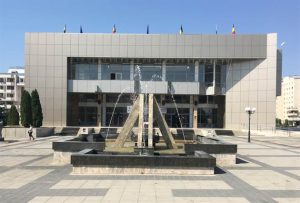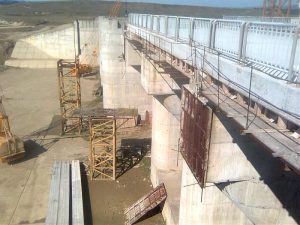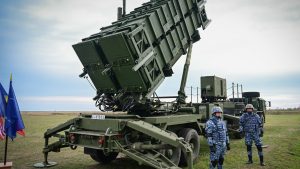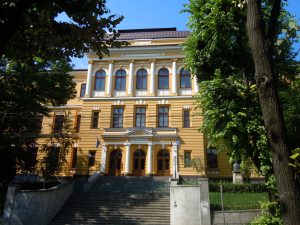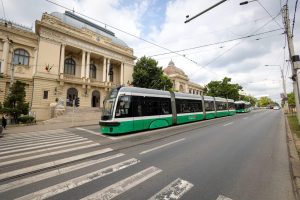
If until the elections in Bessarabia only idealists were talking about the unification with Romania, now the subject was dropped even by them. As Vladimir Voronin, the new President elected by the Parliament has already announced Moldavia’s rapprochement to the union Russia-Byelorussia, to speak about the unification with Romania is pure naiveness. It seems as if we considered the unification of the two Koreas, fundamentally different states, less under the aspect of language and ethnicity. And yet, in South Korea, analysts talk a lot about unification.
The other day, Vladimir Voronin came to visit in Bucharest. A visit of little proportions, because of the fact it took place in a more general context, the one of the summit on environmental problems, in which eight chiefs of state in the zone took place. Yet, Iliescu met Voronin officially, like Premier Adrian Nastase. Very important issues were not approached, as expected.
"What we want is to ignore the normal differences, of political and ideological nature. What we appreciated was the practical, pragmatic approach of the relationships between our countries, which shouldn’t diminish in any way for the next period of time", Iliescu was declaring after the official meeting.
On the other side, Voronin agreed with his collocutor, but he wanted to ass that Moldavia’s economic interests presently leads towards Russia. Republic of Moldavia, which now needs a big infusion of external capital, is a state in which only really adventurous investors can come. The agreements with the international financial forums are compromised for a long time, actually with no chances to be de-blocked in the next years. The only ones with a strategic interest at Kishnev are Romania and Russia. A competition obviously unequal, as long as the huge resources of Russia feel no real diminution sending part of it in Moldavia. Practically, on default of a real alternative, Moldavia will remain in Russia’s sphere of influence, even if it wanted the contrary.
But are there chances that the contrary be wanted at Kishnev? Here is a declaration made by Voronin two weeks ago, at the Congress of the Communists’ Party: "With the help of the progressive forces form all over the world, Moldavia will resist until the end in the middle of the imperialist predators, like Cuba resists in front of the United States". Voronin’s first visit abroad was in Moscow. In a diplomatic language, the first visit abroad of a newly elected chief of state is extremely important.
Yet, there would exist a series of reasons for us to affirm that the problem of Romania’s unification with Bessarabia might be differently seen in the next years. The economic policy of the Communist Voronin cannot reach any result. It is based upon Russia’s help and a centralized administration, by the state, of the limited internal resources. Nowhere in the world such politics led to economic development, on the contrary.
The poverty in which most Bessarabians are is ignored by most of the Romanians, in spite of the low standard of life here. More than half of the Moldavia’s population, form teachers to uniforms, live form one day to the other, from little businesses or petty thefts. All this leads nowhere, as it cannot create resources, but it drains the existent ones, poor anyway.
Instituting an authoritarian regime, like the one of Fidel Castro in Cuba, is also extremely little probable at Kishnev. Unlike the Cubans, the Bessarabians know how to get in the street to protest, even if they have to fight with the police forces. A regime similar to the one before 1990 has no chances to succeed, as, if it doesn’t improve the standard of life, it will be violently removed, if not democratically possible. Meanwhile, Romania’s economic growth will very probably consolidate. The anti-Romanianism of many officials in Bessarabia is not something impossible to remove. It can be accepted that the massive feelings of indifference towards Romania are, at a certain measure, the result of a long-lasting manipulation. But the main cause is the fact that the Bessarabians who come to Romania do not feel at all what a Romanian feel when going to Paris. But perception goes the positive way, helped, on the one hand, by the economic deterioration in Moldavia and, on the other, by the improving of the standard of life in Romania.
From this point of view, though it seems cynical, and also paradoxical, the coming back to power of the communists in Kishnev could prove to be in several years useful for the Bessarabians’ feelings towards Romania. If the difference of standard of life between Moldavia and Romania would be the same as the one between Romania and Germany, a referendum for the unification with Moldavia would undoubtedly have a positive result.
Let’s conclude with a little arithmetic. Germany "introduced" in the former Democratic Republic about one tenth of the Gross Domestic Product, in the first years after the unification, in order to get the standard of life to a comparable limit. In strictly proportional terms, this would mean that Romania should invest in Moldavia about three billion dollars. A huge sum, which, if ever applied, the decision that should start it would represent assuming a big political responsibility. Will anyone do it?
(Dan POPA)


